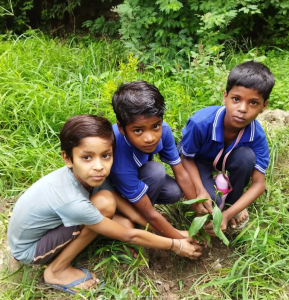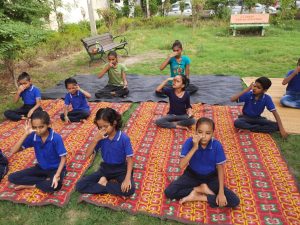Written By Arushi Brotia
Neerja Saxena’s Footpathshala is an initiative that intertwines education and environmental consciousness in the most remarkable way
The car slows as I near her house, my eyes catching the sign that reads Neerja Footpathshala—a humble board mounted just outside her society in Indirapuram, Ghaziabad. Below it, a carpet is spread over the concrete of the road, a makeshift classroom for children whose laughter and lessons merge with the city’s bustle.
Neerja’s Footpathshala
As I step inside her home, Neerja greets me with a bright smile, radiating warmth and purpose. By the staircase, a neat stack of plastic chairs rests in a corner—seats for her students when the footpath becomes their classroom. The simplicity of the setting contrasts with the magnitude of the work she has been doing for years. What started as an act of feeding the hungry during the pandemic has evolved into a quiet revolution—an initiative that intertwines education and environmental consciousness in the most remarkable way.
A life redirected towards purpose
Neerja Saxena was on the brink of retirement when she chose to further her education, enrolling in a master’s programme in social work. By the time she completed her 23-year-long service at NTPC, she was armed with a degree and a newfound resolve—to dedicate her time to those who needed it the most.
But life had its own way of directing her path. As the world came to a standstill in the wake of COVID-19, Neerja found herself face-to-face with the harsh reality of daily wage labourers and their families—starving, forgotten, and left to fend for themselves. What began as an effort to provide meals to these families soon transformed into something bigger. The children, whose parents toiled to survive, had no access to education. Neerja saw not just a gap but an opportunity. She began teaching them—first at her home, and when the numbers grew, on the very footpath outside.
Where education and climate consciousness intersect

For Neerja, education was never just about literacy; it was about shaping responsible, aware individuals. But how do you teach children about dignity when they come from backgrounds of struggle? How do you make education feel like a privilege, not charity? Neerja found an answer in sustainability.
Instead of asking for money, she began accepting plastic waste as school fees. Each child contributes eco-bricks—plastic bottles stuffed with non-biodegradable waste—which are then sent for recycling. “This way, the dignity of education is maintained,” she explains. “They don’t feel like they are receiving something for free. Instead, they are contributing while also understanding their role in protecting the environment.”
It was a simple yet profound exchange—education for sustainability. In just a couple of years, these children, who once scattered waste, became the ones picking it up. More than 4,000 eco-bricks have been collected so far, diverting hundreds of kilograms of plastic from landfills. The lesson goes beyond books; it becomes a lived experience.
Planting seeds of awareness
But Neerja’s efforts don’t stop at recycling. Her initiative includes tree plantation drives, where children actively participate in planting and nurturing saplings. “When a child plants a tree, they develop a relationship with it,” she says. “They water it, they watch it grow—it instils a sense of responsibility towards nature.”
Her students don’t just learn to read and write; they learn to be conscious citizens of the planet. She instils in them the practice of gratitude—whether it’s pausing for a moment of silence in remembrance of someone or expressing thanks for what they receive.
A lone warrior, a determined smile
Neerja has been a lone wolf, a warrior who has stood alone through most of her life. She endured personal struggles and faced societal judgments that would have broken many. Yet, the determined smile on her face tells a story of victory—the quiet triumph of someone who has fulfilled her purpose despite the odds.
A breath of fresh air in a world that needs it
As we sit in her room, the chill of Delhi’s winter sneaks in like an uninvited visitor, but amidst that cold, Neerja herself feels like a fresh wisp of air—gentle, refreshing, necessary. In a world grappling with climate change, she is the kind of presence we need more of. One who doesn’t just talk about change but embodies it, one action, one child, one eco-brick at a time.
